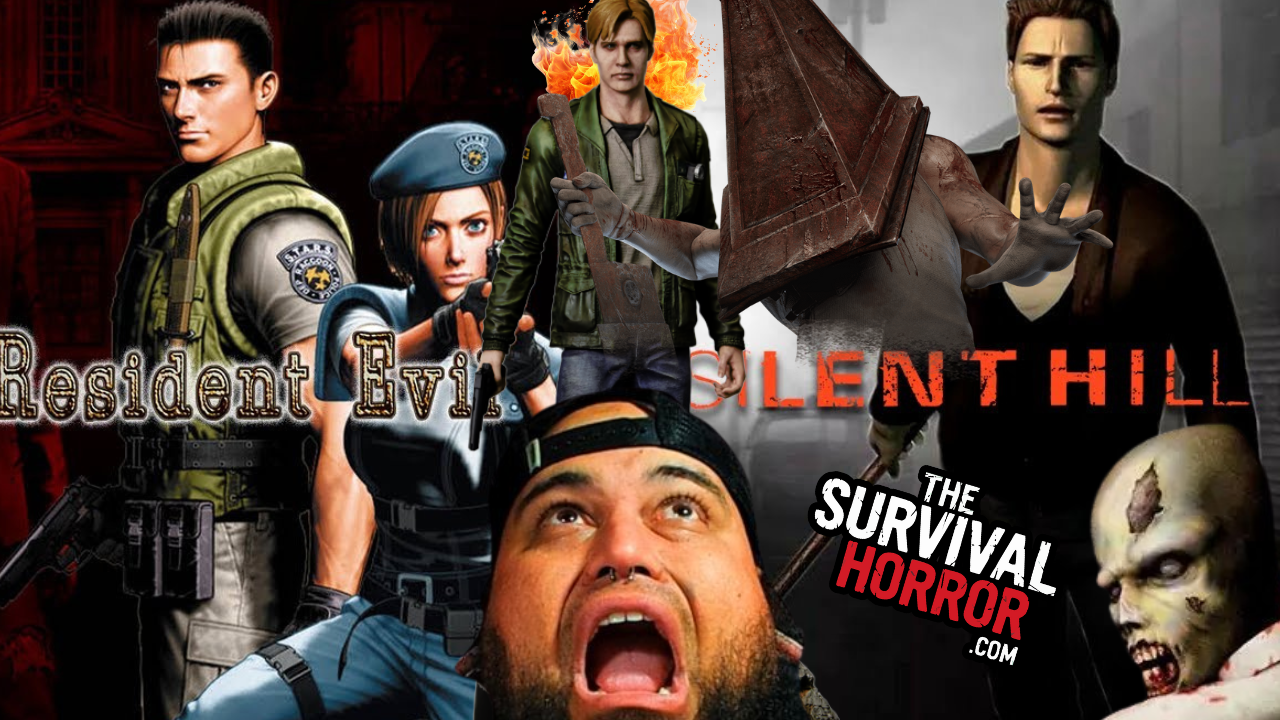
There’s been a long-standing debate in the horror gaming community: Is psychological horror really its own genre? Some argue that all horror is psychological, suggesting there’s no need to distinguish it from survival Horror. But that interpretation overlooks the history, design philosophy, and emotional intent that make psychological horror a unique experience. This subgenre didn’t appear out of nowhere it evolved directly from survival horror, shifting its focus from external threats to the internal struggles of the human mind.
Before Resident Evil defined the term “survival horror,” two important games laid the groundwork for its existence. Sweet Home (1989), a 2D RPG from Capcom, introduced atmospheric tension, limited inventory, vulnerable characters, and puzzle-based exploration. Its haunted mansion setting and item based progression directly inspired Resident Evil’s DNA. Alone in the Dark (1992) added fixed camera angles and puzzle solving in a 3D environment, defining the visual and mechanical language of early survival horror gaming. It’s no exaggeration to say that Resident Evil was originally conceived as a modern remake of Sweet Home heavily influenced by Alone in the Dark before becoming its own identity. Mikami has said openly that those influences are Clear. With these influences combined, Resident Evil refined and popularized survival horror a genre built around gameplay tension, scarcity, and the fear of external danger.

Then came Silent Hill (1999), which redefined everything. Instead of focusing on monsters and limited ammo, it turned its gaze inward. Silent Hill replaced external horror with psychological torment, shifting the question from “Can I survive this?” to “Can I survive myself?” The change was subtle yet transformative. Silent Hill took inspiration from films like Jacob’s Ladder and Hellraiser known for their unique approach to Horror labeled as “Imperfect Horror”. Survival horror relies on gameplay tension, the management of health, resources, and enemies. Psychological horror relies on emotional and cognitive tension, the management of guilt, trauma, and memory. Where one threatens the body, the other threatens the mind. The fear of dying becomes the fear of knowing. Mechanical challenge becomes psychological interpretation.

Many fans say all horror is psychological, and while that’s true to an extent, it oversimplifies what psychological horror does differently. Fear may be subjective everyone reacts differently to monsters or jump scares, but trauma isn’t. Trauma consistently shapes memory, perception, and behavior. Psychological horror weaponizes that by forcing players to confront unresolved pain and emotional wounds. It makes the player complicit in the character’s mental deterioration. One fear is external, shaped by threat; the other is internal, shaped by meaning. Survival horror asks what happens if we fail. Psychological horror asks what happens if we keep going. That’s why games like Silent Hill 2 linger in players’ minds long after they end, the fear doesn’t fade; it’s understood.




Some claim modern horror leans too heavily on trauma, but there’s a reason for that. Today, conversations around mental health, identity, and memory are more open than ever before. The human psyche is now explored in ways that media from the 1990s avoided. Films and games that once existed in niche spaces, dismissed as “too personal” or “too disturbing,” are now viewed as culturally important. Psychological horror was ahead of its time it gave players a mirror to their own fragility long before the world was ready to look.





A modern example of this evolution are games like BrokenLore, Post Trauma, The Medium, Karma the Dark World, Signalis is a survival Horror with very deep topics that trigger similar emotions to Silent hill back in the day and even one of the latest Survival Horror Hits Cronos: The New Dawn which has a heavy psychological lore. Some of them rather than relying on combat or cheap scares, it focuses on emotional reflection and internal struggle. It’s less about fighting monsters and more about confronting the things that haunt us. Some even are called “Walking Simulators” because they often rely on just narrative and puzzles while they have an immersive narrative that captivates the player. Others carry a combination of but still dig deep in their story telling. They carry the same spiritual lineage as Silent Hill 2, Haunting Ground, and Rule of Rose, proving that psychological horror can still deliver emotional impact in a time when gaming often prioritizes speed and spectacle over introspection.
In the end, survival horror and psychological horror are siblings connected by blood but defined by their differences. Survival horror asks whether you can endure the horrors outside of you, while psychological horror asks whether you can live with the horrors within. Both matter, Both influence each other. Even on Action Packed games far from been survival horror like Resident Evil 6 We can see the trauma on the psychological aspect of Chris’s story. But psychological horror stands apart as its own because it doesn’t just make us afraid it forces us to understand why.

Psychological horror doesn’t just trigger fear; it interrogates it. Sweet Home and Alone in the Dark gave survival horror its soul before Resident Evil made it famous. Resident Evil gave Silent hill the mechanics it needed to tell a deeper and captivating story. One tests your ability to stay alive. The other tests your ability to live with what you’ve seen. This lineage keeps evolving with time and great games keep coming out. I can’t wait to play all these stories that Developers are getting ready to Tell. What a time to be a Fan of these Games.
Thanks For Reading! – El Joe
Follow me for more content: yosoyelxjoe – Link in Bio & Creator Tools | Beacons

